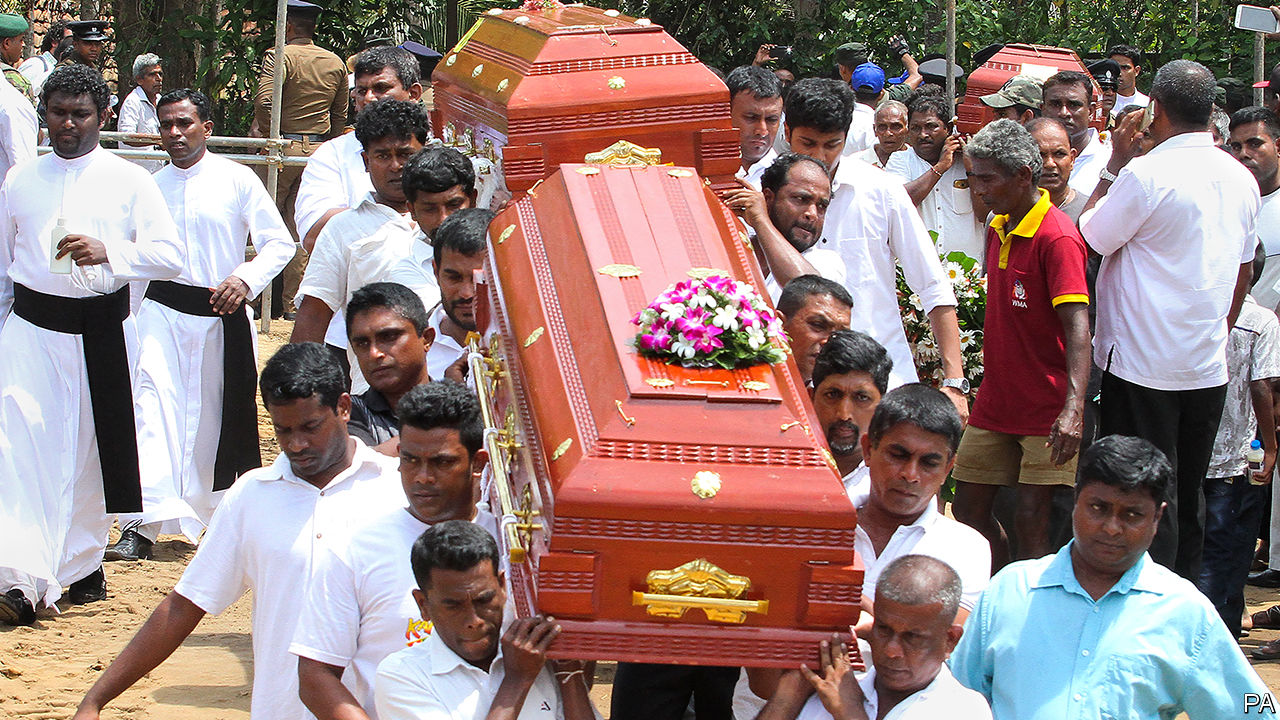
A FEW MONTHS ago National Thowheed Jamath (NTJ), an Islamist group from Sri Lanka, was known for little more than defacing statues of the Buddha. On April 21st nine of its members walked into churches and luxury hotels on the island and blew themselves up, killing more than 350 people. Islamic State (IS) claimed responsibility for the deadliest set of terrorist attacks in Asia in modern times (see article).
How could this happen? Start with Sri Lanka’s bungling. The world has learned a great deal about how to thwart terrorists since September 11th 2001. A crucial lesson is that it is vital to share information quickly and widely, so that fragmentary intelligence can be pieced together and followed up. This is precisely what Sri Lanka’s government failed to do, despite receiving unusually detailed warnings. Part of the reason for that appears to be shameless politicking. The island’s president, Maithripala Sirisena, has been at loggerheads with the prime minister, Ranil Wickremesinghe, since the former tried to sack the latter in October. Mr Wickremesinghe has been excluded from meetings of the national security council since then.
A second explanation is that, although Sri Lanka has no history of jihadist terrorism, nor even of much tension between Muslims and Christians, it sits in an ocean of bubbling extremism. In recent decades in South Asia, intolerant strands of Islam have edged out the broad-minded forms that used to predominate. That has created fertile ground for jihadists. The Maldives, just a short flight from Sri Lanka, sent more recruits to IS in Iraq and Syria as a proportion of its population than any other country. Bangladesh, across the Bay of Bengal, has suffered a wave of Islamist attacks on secular activists and minorities in the past six years. Sri Lanka’s suicide-bombers reportedly contacted IS veterans from both those countries. International jihadists have also cropped up across the Palk Strait in the Indian state of Tamil Nadu, which is bound to northern Sri Lanka by ethnic kinship. It was an IS suspect arrested there who is said to have yielded some of the intelligence passed to Sri Lanka’s government (which was then ignored).
On top of all this, Mr Wickremesinghe says that some of the bombers had been to Syria; they are likely to have been among the three dozen Sri Lankans who have fought with IS. In short, Sri Lanka is not as quarantined from global jihadist networks as one might think. Few countries are. And as IS has been bombed out of its so-called caliphate, thousands of its fighters have dispersed the world over, grafting themselves onto local Islamist groups like Sri Lanka’s NTJ and disseminating ideology and expertise. The threat of jihadist attacks is therefore likely to grow.
Last, the form of the atrocity in Sri Lanka—striking not only at hotels full of Westerners, but also at three churches—reflects the changing pattern of jihadist violence. Though al-Qaeda railed against “Jews and Crusaders” in the 1990s, it made its name striking secular targets, such as embassies and warships. Its more radical offshoot, IS, instead came to prominence in Iraq by slaughtering local Muslims who disagreed with its bloodthirsty interpretation of the Koran, often with a degree of violence that even al-Qaeda’s leaders thought excessive.
IS has exported its modus operandi. In 2017 al-Qaeda in the Indian Subcontinent (AQIS), al-Qaeda’s South Asian branch, published a code of conduct that said Hindu, Muslim and Buddhist civilians and places of worship would not be attacked. By contrast, IS proudly claims attacks on religious targets, including churches in Egypt, the Philippines, Indonesia, Pakistan and now Sri Lanka. The aim of such sectarian terrorism is to promote the narrative of a clash of civilisations—an aim the jihadists share with white-nationalist terrorists, such as the one who attacked two mosques in New Zealand last month.
Both groups want to sow discord and force people to choose sides. The jihadists would love to provoke a backlash against Muslims, in the hope of pushing more Muslims into their camp. Neither governments nor citizens should fall into that trap. Instead, they should work harder to catch terrorists, while doing their best to soothe relations between Muslims and their neighbours. It was the Muslim Council of Sri Lanka, remember, that first reported NTJ to the authorities three years ago.







